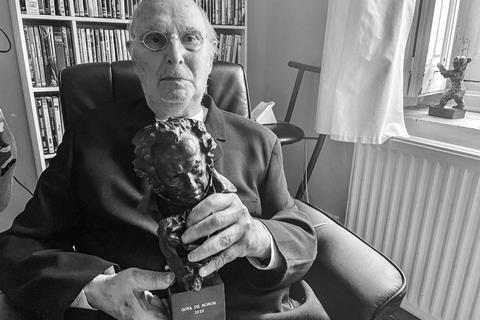
Legendary Spanish filmmaker Carlos Saura has died aged 91.
In a statement today (February 10), the Spanish Academy of Cinematographic Arts and Sciences said Saura, “one of the fundamental figures in the history of Spanish cinema”, died at home surrounded by loved ones.
He had been due to receive the Academy’s Honorary Goya Award at Spain’s Goya awards ceremony on Saturday. He was presented with the statuette at home a few days ago.
Saura’s most recent film, the documentary Walls Can Talk, a reflection on humanity’s need to produce art from Palaeolithic to contemporary graffiti, premiered at the 2022 San Sebastian film festival and also screened at Ventana Sur.
Born in Huesca in January 1932, his first works were documentary shorts dating back to the mid-1950s. His feature debut Los Golfos (The Delinquents) premiered in Cannes in 1960, gaining widespread international attention. Six years later Saura directed what is still considered a key title in European cinema, The Hunt, which was awarded with the Silver Bear for best director in Berlin. The film is metaphor and study of the Civil War and Spanish history through a depiction of a rabbit hunt.
After this period, Saura transitioned from neorealist films towards a cinema rich in symbolism and poetic but popular characters, usually within tragic plots.
Saura won the Special Jury Awards in Cannes with Cousin Angelica (1974) and Cría Cuervos (1976), becoming one of the most internationally acclaimed Spanish filmmakers alongside Luis Buñuel.
Other essential titles in his filmography are Llanto Por Un Bandido (1964), Peppermint Frappé (1967), Stress-Es Tres-Tres (1968) and Elisa, My Life (1977).
Saura spent his career in Spain and suffered public attacks and censorship from dictator Francisco Franco’s regime, notably forThe Garden of Delights (1970) and Anna And The Wolves (1973).
In 1979 Saura won the Academy Award for Best International Feature Film with Mama Turns 100. He won the Berlinale’s Golden Bear for Deprisa, Deprisa in 1981.
In the 1980s, Saura directed a widely appreciated Flamenco trilogy, spanning Blood Wedding (1981) Carmen (1983) and El Amor Brujo (1986).
In a statement, Film Academy of Spain president Fernando Méndez Leite said Saura was “one of the greatest directors of Spanish cinema whose personal, varied and very creative work has left an indelible mark on the history of our cinema and Spanish culture”.
Saura’s artistic production also embraced photography books and novels. During his last years, his films spanned topics such as flamenco (Flamenco Flamenco), tango (Argentina), painting (short Goya 3 de Mayo) and Mexican music (The King Of All The World). A project about Johann Sebastian Bach had also been announced.

























No comments yet